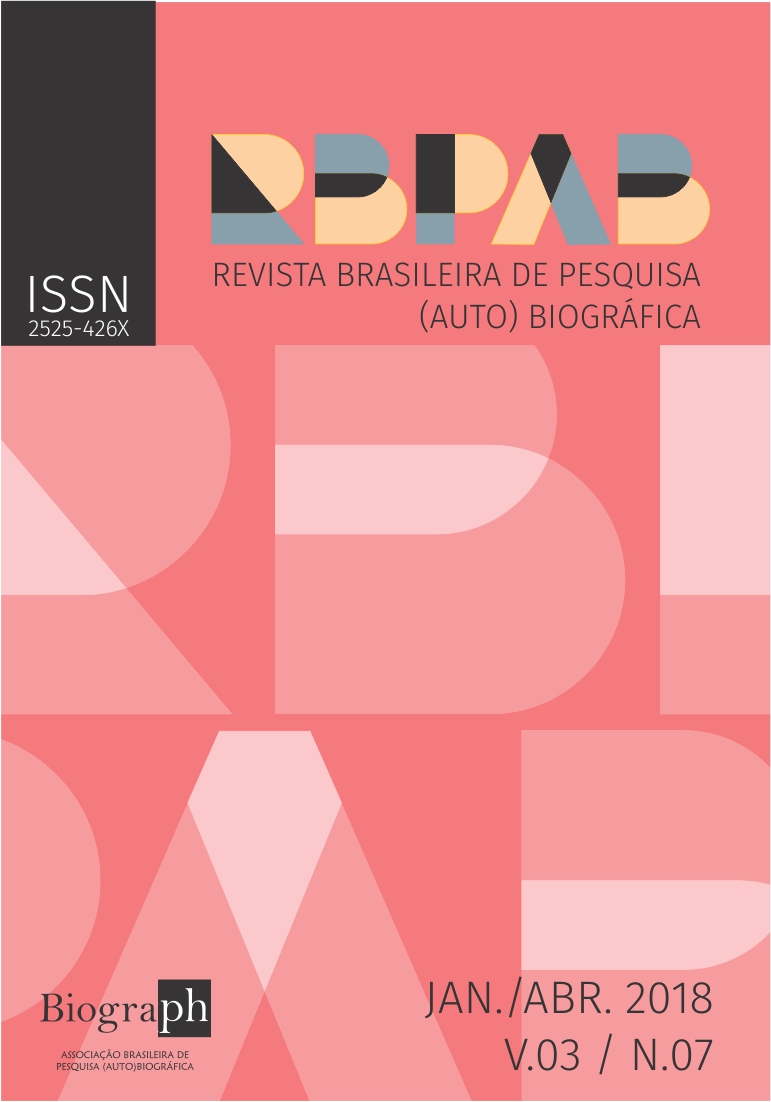Silences and voices of mediterranean crossings: (inter)subjectivity and empathy as research practice
DOI:
https://doi.org/10.31892/rbpab2525-426X.2018.v3.n7.p67-79Parole chiave:
MemoryAbstract
This essay is dedicated to analyze the role of intersubjectivity in my oral research project with migrant people coming from or culturally connected to the Horn of Africa. In the past 5 years, I have interviewed people coming from Somalia, Ethiopia and Eritrea to Europe, men and women, differently aged. My goal was to study the postcolonial and diasporic memory, the journeys from the Horn of Africa to Europe, the relationship of migrant people with friends and parents in other parts of the world. In this paper, I point out my oral history research approach and the relevance of empathy during the interviews.Downloads
Riferimenti bibliografici
ARMITAGE, Susan; BERGER GLUCK, Sherna. Reflections on women’s oral history: An exchange. Frontiers: A Journal of Women Studies, v. 19, n. 3, p. 1-11, 1998.
BADIOU, Alain. Théorie du sujet. Paris: Seuil, 1982.
BALIBAR, Etienne. Europe as borderland. Alexander von Humboldt Lecture. Human Geography, University of Nijmegen, November 10, p. 1-11, 2004.
BENJAMIN, Walter. The Arcades Project. Cambridge, MA: Harvard University Press, 1999.
BLEE, Kathleen. Evidence, empathy and ethics. Lesson from the oral histories of the Klan. Journal of American History, v. 80, n. 2, p. 596-606,1993.
BRIGHTON, Ourstory. Daring hearts: lesbian and gay lives of 50s and 60s Brighton. Brighton: QueenSpark Books, 1992.
BROWN, Gavin. Listening to queer maps of the city: gay men’s narratives of pleasure and danger in London’s East End. Oral History, v. 29, n. 1, p. 48-61, 2001.
DANEWID, Ida. White innocence in the black mediterranean: hospitality and the erasure of history. Third World Quarterly, v. 38, n. 7, p. 1674-1689, 2017.
DE MARTINO, Ernesto. La fine del mondo. Contributo all’analisi delle apocalissi culturali. In: GALLINI, C.; MASSENZIO, M. (Eds.). La fine del mondo, Turin: Einaudi, 2002. p. 1-370.
FOUCAULT, Michel. Security, territory, population: lectures at the Collège de France 1977–1978. M. Senellart, editor; G. Burchell, translator. Basingstoke: Palgrave Macmillan, 2007.
FRISCH, Michael. A shared authority: essays on the craft and meaning of oral and public history. Albany, NY: Suny Press, 1991.
FRISCH, Michael. Three dimensions and more: oral history beyond the paradoxes of method. In: HESSE-BIBER, Sharlene; LEAVY, Patricia. (Eds.). The handbook of emergent methods. New York: Guilford Publications, 2010. p. 75-94.
GINZBURG, Carlo. Il formaggio e i vermi. Turin: Einaudi, 1976.
GLUCK, Sherna Berger. Women’s words: the feminist practice of oral history. Routledge. New York: Einaudi, 1991.
GLUCK, Sherna Berger. The representation of politics and the politics of representation: historicizing palestinian women’s narratives. In: SCHNEIDER, William. (Ed.). Living with stories: telling, re-telling and remembering. Logan, UT: Utah State University, 2006. p. 4-16.
GLUCK, Sherna Berger. Has feminist oral history lost its radical/subversive edge? Oral History, v. 39, n. 2, p. 63-72, 2011.
GRELE, Ronald J. Can anyone over thirty be trusted? A friendly critique of oral history. In: GRELE, Ronald J. (Ed.). Envelopes of sound: the art of oral history. Chicago: Precedent Publishing, 1985. p. 88-113.
GRELE, Ronald J. Subjectivity and multiculturalism. In: GRELE, Ronald J. (Ed.). Oral history, international annual of oral history. Westport, CT: Greenwood Press, 1990. p. 137-145.
HALEY, Alex. The autobiography of Malcolm X. New York: Grove Press, 1965.
JENNINGS, Rebecca. Lesbian voices: the Hall Carpenter Oral History Archive and post-war British lesbian history. Sexualities, v. 7, n. 4, p. 430-445, 2004.
LAMONT, William. (Ed.). Historical controversies and historians. London: UCL Press, 1998.
LÈVINAS, Emmanuel. Le temps et l’autre. Saint-Clément-de-Rivière, France: Fata Morgana, 1980.
LIDDINGTON, Jill. Rediscovering suffrage history. History Workshop Journal, v. 4, p. 192-201, 1977.
LOMAS, Clare. Men don’t wear velvet you know! Fashionable gay masculinity and the shopping experience. Oral History, v. 35, n. 1, p. 82-90, 2007.
MEZZADRA, Sandro. Diritto di fuga. Migrazioni, cittadinanza, globalizzazione. Verona: Ombre Corte, 2001.
PASSERINI, Luisa. On the use and abuse of oral history. In: PASSERINI, Luisa. (Ed.). Storia orale: vita quotidiana e cultura materiale delle classi subalterne. Turin: Rosenberg & Sellier, 1978. p. 70-88.
PASSERINI, Luisa. Oral history and people’s culture. History Workshop, n. 13, p. 88-98, 1979a.
PASSERINI, Luisa. Work Ideology and consensus under Italian fascism. History Workshop, n. 8, p. 84-92, 1979b.
PASSERINI, Luisa. Torino operaia e fascismo: una storia orale. Rome and Bari: Laterza, 1984.
PASSERINI, Luisa. Memoria e utopia. Il primato dell’intersoggettività. Turin: Bollati Boringhieri, 2003.
PERKIN, Harold. Social History in Britain. Journal of Social History, v. 10, n. 2, p. 129-143, 1976.
PORTELLI, Alessandro. L’ordine è già stato eseguito. Roma, le Fosse Ardeatine, la memoria. Rome: Donzelli, 1999.
PUWAR, Nirmal. Space invaders. Race, gender and bodies out of place. New York: Berg Publishers, 2004.
SAID, Edward. Orientalism. New York: Penguin, 1978.
SAID, Edward. Culture and imperialism. New York: Chatto & Windus, 1993.
SALAZAR, Claudia. A third world women’s text: between the politics of criticism and cultural politics. In: BERGER GLUCK, Shema; PATAI, Daphne. (Eds.). New York: Palgrave, 1991. p. 93-106.
THOMPSON, Paul. The voice of the past: oral history. Oxford: Oxford University Press, 1988.













































